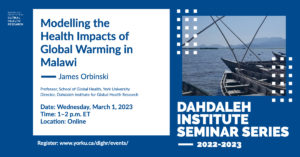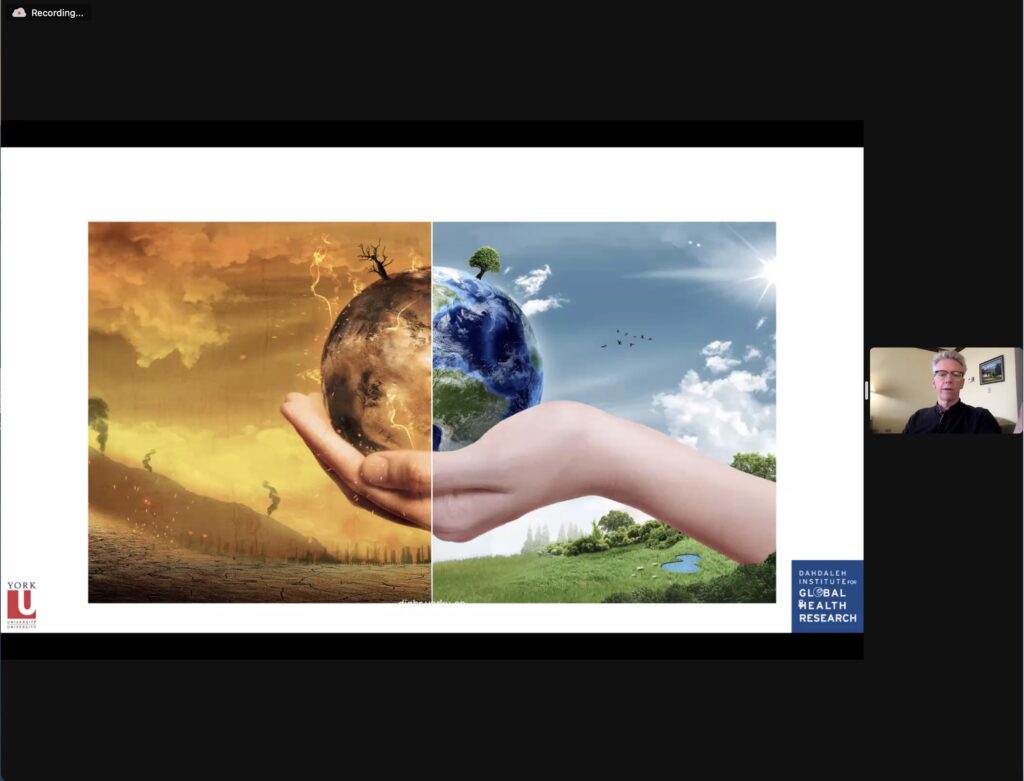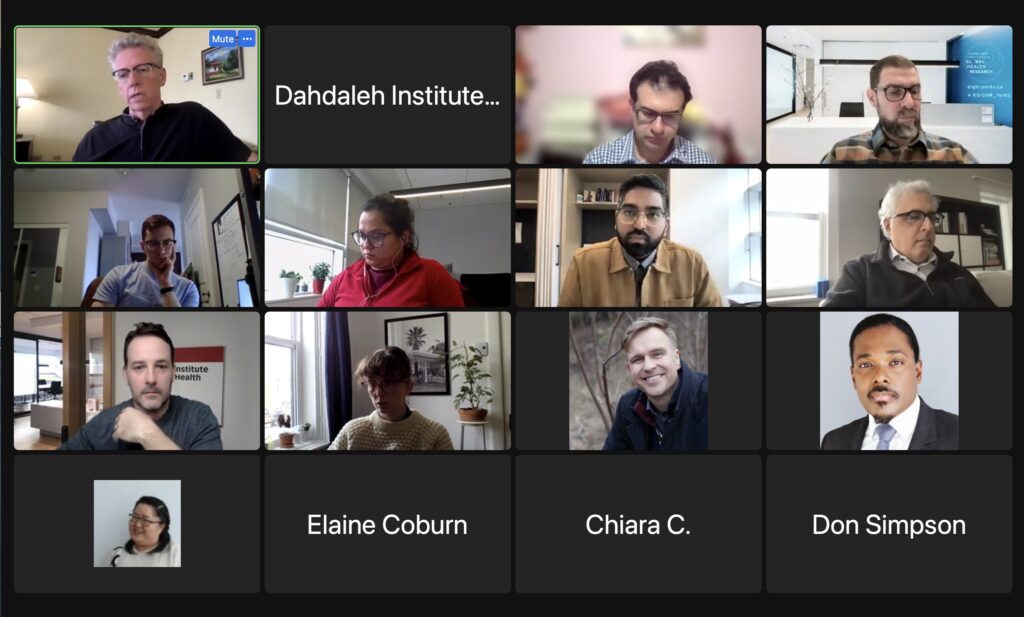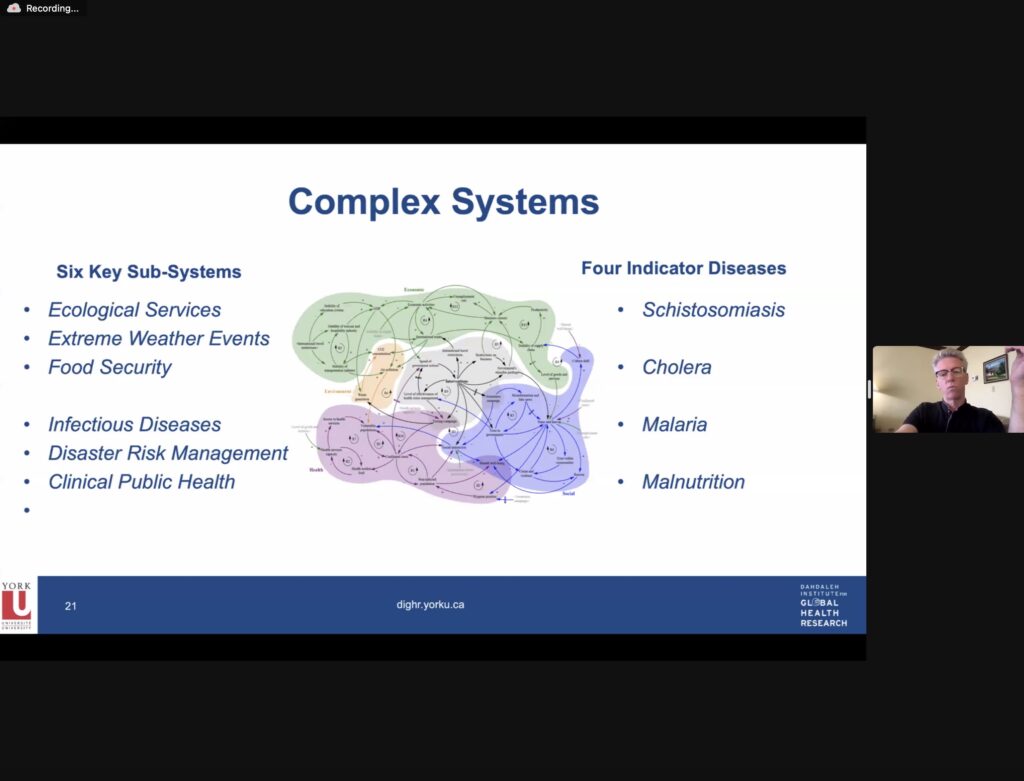Post
Published on March 3, 2023

On March 1, as part Climate Change Research Month series of events hosted by York University Organized Research Units (ORU), Dahdaleh Institute's inaugural director James Orbinski presented the agent-based modelling and systems dynamic modelling research his team has been working on in the Chilwa Basin, Malawi.
The effects of climate change have taken a massive toll on biodiversity, migration patterns, and human health. At the same time, we are seeing greater income inequality and a wider wealth disparity between nations. Dr. Orbinski stated over 800 million people today are food insecure and unable to meet their basic food needs. He emphasized the dependence that humans have with nature as we approach the sixth great extinction caused by human activity.
Dr. Orbinski and his research team took an ecosystem approach to health as they involved community and local policy makers to inform them of solutions to adapt to the realities of climate change. The research analyzed the everyday lives of the residents of the Chilwa Basin, including housing, fishing, farming, animal husbandry, place of worship, water borehole, wood, and charcoal making. They also take in great consideration to the cultural aspects of the community, such as gender dynamics and sacred traditions. Equipped with a holistic understanding of the local community, the research team were then able to map the complexities of the local ecosystem. The complex system was separated into six subsystems that included ecological services, extreme weather patterns, food security, infectious diseases, disaster risk management, and clinical public health. It allowed for a better understanding of the health impacts caused by diseases and how to properly mitigate them.
Drawing from a wide range of multidisciplinary data, Dr. Orbinski and his research team are able to measure variables and their relationships to the environment. They visually mapped the data which allows them to see patterns between subsystems, draw conclusions, and produce solutions that can be implemented within local communities for early health and disaster management. For example, Dr. Orbinski highlighted the used this modelling system to map the use of charcoal burning as a source of energy. Charcoal burning contributes to other climate and health concerns such as deforestation leading to soil erosion, lake water eutrophication, which exacerbates the spread of infectious diseases.
Dr. Orbinski and his team aim to find life-centered, nature-based solutions to treat, prevent, and adapt to climate change challenges and improve the health of local communities. Furthermore, the ideas introduced to the audience demonstrated the complexities of local communities and utilized various data points to seek local solutions to prioritize the future health of the population and the planet.
For more information, please read Professor Elaine Coburn's review here: https://www.yorku.ca/research/category/dahdaleh-institute-for-global-health/2023/03/climate-change-and-planetary-health/
Watch the seminar presentation below:
Connect with James Orbinski
Themes | Planetary Health |
Status | Active |
Related Work | |
Updates |
N/A
|
People |
You may also be interested in...
Announcing the Winners of the 2024 Seed Grants in Critical Social Science Perspectives in Global Health Research
Following the fifth annual Critical Perspective for Global Health Research (CPGH) workshop in April, the CPGH Steering Committee is delighted to announce that the following York researchers have been awarded this year’s $7,000 seed grants ...Read more about this Post
Call for Presentations – 2024 Critical Social Science Perspectives in Global Health Workshop
Returning for a fifth year, the Critical Social Science Perspectives in Global Health (CPGH) Research workshop will be held on Friday, March 1 from 9:30 a.m. to 1:30 p.m. ET. Join us to gain novel ...Read more about this Post
Recap – Embracing Indigenous Insights for Earth's Sustainability
April marks Earth Month, which is a time dedicated to promoting environmental protection and increasing awareness about our planet's challenges. Contemplating on this month’s theme, we look back and reflect on the perspectives of Dr. ...Read more about this Post



